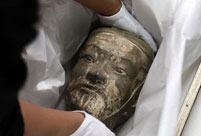 Giant Spider-Man appears in Fuzhou
Giant Spider-Man appears in Fuzhou
 Beautiful Chinese-built roads in Africa
Beautiful Chinese-built roads in Africa Sagya Monastery in Tibet
Sagya Monastery in Tibet
 Young Chinese drive consumption
Young Chinese drive consumption
 The life of a model: Not as glamorous as it seems
The life of a model: Not as glamorous as it seems
 Hello Kitty, happy 40th birthday!
Hello Kitty, happy 40th birthday!
 The Western Qing Mausoleum
The Western Qing Mausoleum
 Avant-garde approach to graduation photos
Avant-garde approach to graduation photos
 Early PLA posters, signatures of an era
Early PLA posters, signatures of an era
 First Russian Street in Tianjin open to public
First Russian Street in Tianjin open to public
 |
| (Photo/People's Daily Overseas Edition) |
"You can you up, no can no bb." The latest Chinglish buzz phrase, having swept through Chinese cyberspace and society, has now made a landing overseas, entering the US web-based Urban Dictionary where it has been liked nearly 4000 times.
According to the entry submitted by 'gingerdesu', "You can you up," meaning 'if you can do it go ahead and do it' , is a Chinglish phrase directed at people who criticize others' work, especially when the critic is not that much better. The entry continues: "Often followed by 'no can no BB', which means ‘if you can't do it then don't even criticize it'".
Linguists say the phenomenon shows that Chinglish is now being accepted by the rest of the world and has been integrated into daily life.
As well as "you can you up", other Chinglish catch phrases, such as "tuhao" and "no zuo no die", have also been recorded on the site.
Coined with roots in Chinese grammar, and even containing Hanyu Pinyin, Chinglish words and phrases are even spreading beyond grassroots websites.
In 2010, an article published by the Economist cited the term "guanggun" (bare branches, or men who will not add to the family tree) to refer to the "overaged" single male; in 2013, "dama" and "tuhao" found their way into the Wall Street Journal and the BBC, and words such as feng shui, Maotai, and gan bu have been admitted to the Oxford English Dictionary.
"The frequent use of Chinglish by foreign institutions suggests that people are looking more to the lifestyle and popular culture of China," says Zhang Yiwu, professor of Peking University's Chinese Department.
"Words like dama and tuhao are so vivid. My friends and I use them a lot - it's so much fun," said Satoshi Nishida, a Japanese student studying at Beijing Language and Culture University (BLCU).
"Behind these Chinglish words and phrases is the Chinese culture. They are reflections of the changes and trends in the Chinese society and they help people from other countries to understand what's happening in China," according to Xing Hongbing, professor with BLCU.
"When the price of gold went down last year, while the super purchasing power of the Chinese bargain-hunting middle-aged women drew worldwide attention, there was no effective way available in other languages to describe them, and "dama" filled the gap very neatly," says Xing.
The article is edited and translated from 《中式英语频入美国草根词典》; Source: People's Daily Overseas Edition.
 A free sky for music
A free sky for music Terracotta Army to the US
Terracotta Army to the US When we are young...
When we are young... Solar halo occurs in Lhasa
Solar halo occurs in Lhasa Photos give cheongsam a new life
Photos give cheongsam a new life Graduates bid farewell to campus in clown costume
Graduates bid farewell to campus in clown costume Badain Jaran Desert: Amazing curves of nature
Badain Jaran Desert: Amazing curves of nature Beautiful Chinese-built roads in Africa
Beautiful Chinese-built roads in Africa High fashion trend welcomed by costumers in Changsha
High fashion trend welcomed by costumers in Changsha The 'Chinese Dad'
The 'Chinese Dad' Chinese mountaineer's gear list
Chinese mountaineer's gear list  Newly recruited police in Hetian hold drill
Newly recruited police in Hetian hold drill  China's most luminous celebrities
China's most luminous celebrities Top 10 most expensive cars in the world
Top 10 most expensive cars in the world 'African Street' in Guangzhou
'African Street' in GuangzhouDay|Week|Month